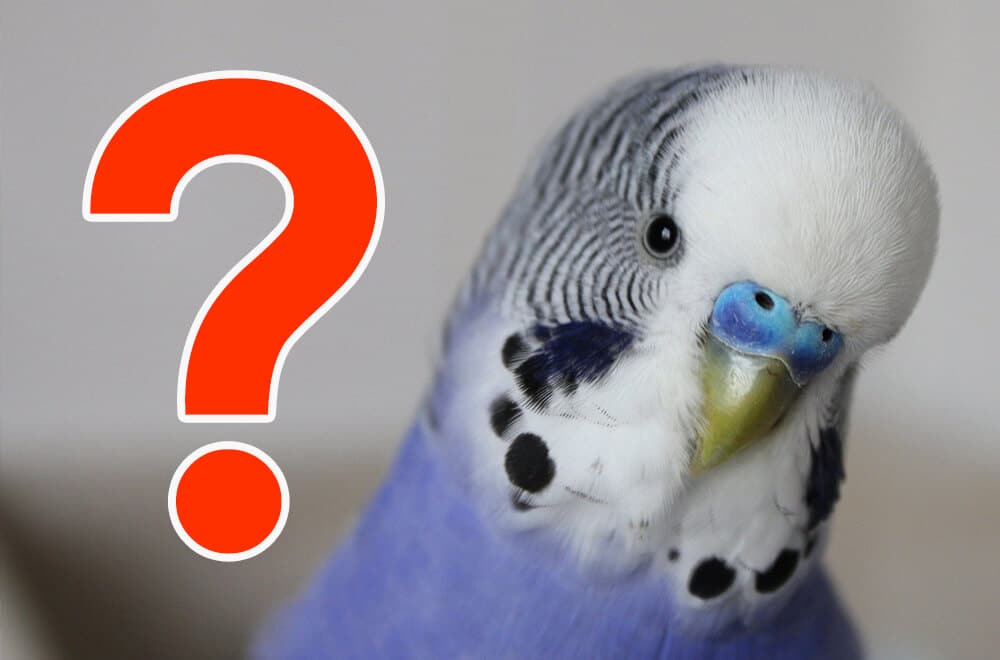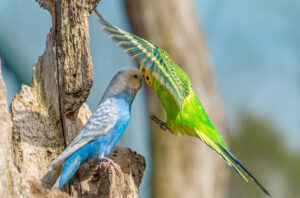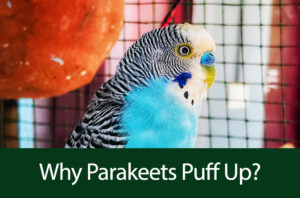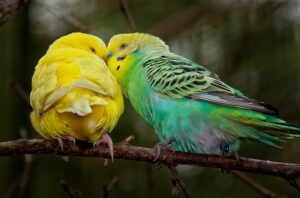Hello budgie lovers! In this comprehensive article, we’ve gathered answers to the most common questions related to parakeets. If you can’t find the answer to your question, do not hesitate to comment below. Your engagement can help others find the information they need to care for their feathered friends.
General Questions
How long do Parakeets live?
In the wild, a budgie lives up to 10 years due to natural predators and an unstable diet. However, under proper care, parakeets can live even longer.
Parakeets live an average of 15 years, but it depends on the species. Parakeets usually live between 5 to 20 years. In order for your parakeet to live as long as possible, you have to know how to take care of a budgie properly. The oldest known budgie was almost 30 years old!
Are parakeets a parrot?
Parakeets, also commonly known as budgerigars (or budgies), are indeed a type of parrot. Despite their small size, they share many traits with their larger parrot relatives.
Do parakeets talk?
Yes, parakeets are an intelligent species of birds that have the ability to talk and mimic sounds. Some parakeets have been known to learn hundreds of words from their owners.
How do you know if your parakeet is young?
Young parakeets have stripes on the cap of their head that go all the way down to the base of the upper beak. If your parakeet has these stripes, the bird is less than 4 months old.
Where are parakeets originally from?
Parakeets originate from Australia. The term parakeet describes any long-tailed parrot, and they have their roots in the vibrant continent of Australia.
Are parakeets known by another name?
Parakeets and budgies are actually one and the same. These little birds are commonly called “parakeets” in the United States while for the rest of the world they are known as budgerigars or budgies.
Is it better to get 1 or 2 parakeets?
Two is better; this way, your budgies won’t get bored. Parakeets, by nature, are flock animals and are not solitary. One reason you might prefer to have just one parakeet is that a single parakeet is generally more affectionate towards its owner.
Do parakeets know their names?
Yes, parakeets are able to learn their own names. Most parakeets have the learning capacity of a 5-year-old human. Building a strong bond and using consistent training techniques can enhance their name recognition.
How do I tell a male from a female budgie parakeet?
The gender identification of a parakeet is usually determined by the color of the cere, a fleshy covering located directly above its beak. The adult budgie male has a blue cere, while the female has a pinkish-brown cere. You can read more about how to identify the gender of a budgie here.
Do parakeets love their owners?
Usually, yes. Parakeets are social little birds that love to spend time with their owners. They often form strong bonds and enjoy interacting with their human companions.
Should you cover a bird cage at night?
Generally speaking, it’s best for most budgies to cover their cage during the night. Usually, budgies love to have just a portion of the cage uncovered and a night light. It gives them a sense that it is time for bed. Note that parakeets require a minimum of 8 hours of sleep each night.
Do parakeets like being petted?
Most parakeets do not particularly enjoy being petted. However, there are other methods to show your affection:
- Talk to your budgie in a happy, excited voice.
- Sing to him/her.
- Whistle.
- Parakeets may enjoy a little show from your side (e.g. dropping different things such as a toilet paper).
Should I let my parakeets out of the cage?
All birds should have a few hours of playtime outside of their cages to promote essential exercise and psychological stimulation. Parakeets are no exception, and providing a safe and supervised environment for them to explore can greatly enhance their well-being.
How messy are parakeets?
The messiness of parakeets can vary based on their numbers. Two parakeets should not be too messy. Budgies are often caught throwing seeds, splashing water, or shaking feathers off, but these natural behaviors are all part of their charm. Embrace the cleaning routine and enjoy their lively antics!
What causes parakeets to puff up?
Parakeets often puff up for various reasons:
- Most common – your little parakeet is sleepy.
- The temperature is too low for them. Puffing up is a way for birds to conserve their body warmth.
- Your budgie may be happy or upset. Observe other signs, as each budgie has its own personality and can react differently.
- Your little one might not feel well. If you notice unusual changes such as loss of appetite or sticky poop, consult a veterinarian.
Is it difficult for three parakeets to get along well?
Definitely not. Keep in mind that the more birds you have, the more space you need. Some parakeet owners say that you can have extra males, but not extra females. Proper introductions and a suitable environment are key to harmonious coexistence.
Why do parakeets stand on one foot?
Parakeets often stand on one foot when they’re in a comfortable atmosphere. They exhibit this behavior while relaxing and when they are sleepy. It’s a sign of contentment and relaxation.
Behavioral & Training Related Questions
Do parakeets like music?
Loud music is a no-no for them. A genre that might put your parakeet’s mind at ease is soft classical music. When your bird whistles, sings, talks, or chatters along with the song that’s playing, it means they enjoy the auditory stimulation.
Why do parakeets scream?
If a parakeet is left alone too often or for too long, they can start to scream due to the lack of affection they usually receive from people around them. Ensuring regular interaction and mental stimulation can help prevent excessive screaming.
How can I tell if my parakeet is happy?
If your parakeet is happy, there will be lots of singing, playing, eating, and sleeping! A joyful budgie is often active, engaged, and exhibits a wide range of vocalizations.
Are parakeets tamable?
Yes, parakeets can be tamed. However, it’s easier to tame a young budgie than a mature one. Patience, consistency, and positive reinforcement are key components of successful taming. You can read tips on taming wild budgies to find out more details.
How do I get my bird to shut up?
A possible way to reduce vocalization is to create a calm environment. Putting a blanket over the cage can help, but remember that parakeets are naturally vocal creatures. Instead of trying to completely silence them, focus on providing a stimulating environment and spending quality time with them.
Questions Related to Budgie’s Health & Wellness
What temperatures are good for parakeets?
Parakeets thrive in moderate temperatures. Ideal daytime temperatures for these birds range from 60°F (15°C) to 80°F (27°C). Parakeets can tolerate slightly higher temperatures, up to 85°F (30°C), without discomfort. Providing a temperature-controlled environment is crucial for their well-being.
Can I give my parakeet fruit?
Yes, it is very good for their health! Parakeets enjoy eating fresh fruits and vegetables. Feeding a variety of fruits will help meet your bird’s nutritional requirements and keep these little birds happy and healthy. However, be cautious and do research before introducing new foods. For example, Avocado is NOT good for your budgie!
Is tap water safe for parakeets?
Breeders usually use tap water and claim that their budgies are healthy. However, if you’re unsure about the quality of your tap water, filtering it is a safe option. Consulting local authorities for water quality reports can also provide valuable information for your parakeet’s health.
Can my parakeet have Coronavirus (COVID-19)?
No, it is unlikely to be a problem for your parakeet. Coronaviruses are usually species-specific, making it unlikely that the virus can spread from humans to pet birds. You can read a more in-depth article about COVID-19 and pet birds here.
Do parakeets get fleas?
No, parakeets do not typically get fleas. Their grooming habits and the structure of their feathers make it difficult for fleas to infest them. However, regular cage cleaning and providing a clean environment are essential for their overall health.
I never see my parakeet drink water.
Parakeets have a unique way of drinking water by using their tongues to draw water into their beaks. This can make it appear as though they’re not drinking much. However, they do drink, and it’s important to ensure fresh water is available at all times.
Parakeet insurance
Considering parakeet insurance is a wise step for your pet’s well-being. Veterinary care can be costly, and having insurance can provide financial assistance in case of unexpected health issues. Research different insurance options to find the one that suits your needs and your parakeet’s health requirements.
If you have any questions or suggestions to improve the current Q&A, please comment below. Your engagement can help others find answers to their questions. Let’s continue to spread the love for budgies!




